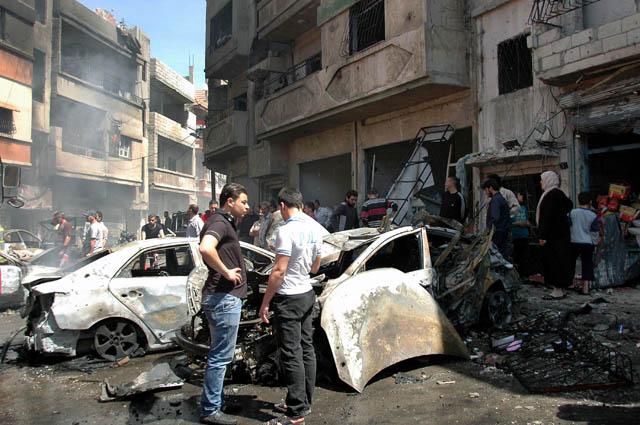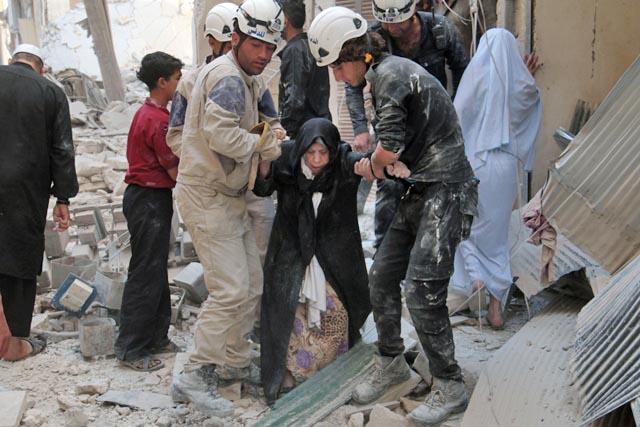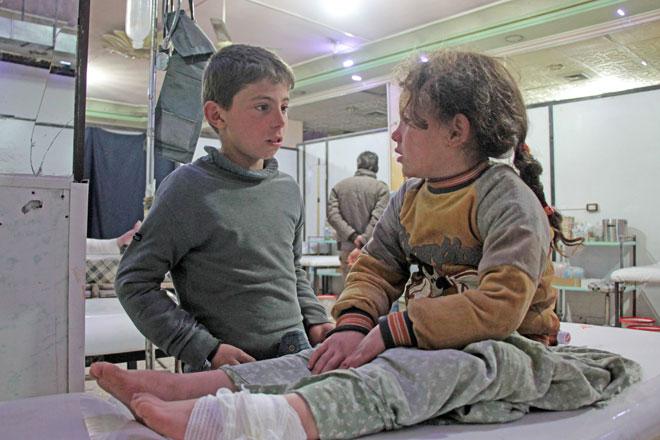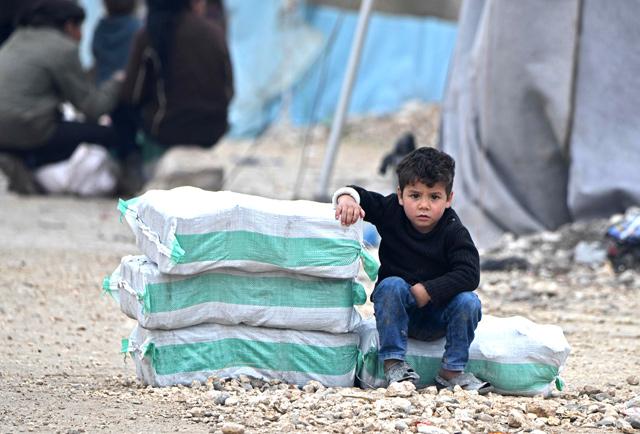You are here
Key jurists slam UN for failure to deliver relief aid inside Syria
By Elisa Oddone - Apr 29,2014 - Last updated at Apr 29,2014

AMMAN — Overcautious United Nations’ interpretation of international law threatens thousands of lives in Syria, a group of prominent international lawyers said on Tuesday, arguing that there is “no legal barrier” for the UN to provide cross-border aid in the war-torn country.
The 37 scholars, including well-known current and retired legal experts at international organisations, top universities and lawyers, said in a letter to UN agencies that the “appalling” humanitarian situation inside Syria has been compounded “by an overly cautious interpretation of international humanitarian law, holding them back from delivering humanitarian aid across borders”.
More than three years into the Syrian conflict, 9.3 million people are in urgent need of relief assistance inside the country with around 3.5 million in “hard to reach” areas mostly concentrated in the opposition-controlled north, they wrote.
“While the United Nations and humanitarian agencies based in Damascus are able to deliver some aid to these people by undertaking ‘cross-line’ operations, both the UN and other humanitarian agencies have long argued that many hundreds of thousands can only be reached effectively from neighbouring countries such as Turkey and Jordan,” the letter read.
But despite a clear UN Security Council demand for humanitarian access across borders, the Syrian government is arbitrarily denying it as it might be inflicting starvation on its own people to weaken opposition groups, a Syrian defector told The Jordan Times speaking on condition of anonymity.
Hakeem Yusuf, senior lecturer of human rights at University of Strathclyde in Scotland and one of the signatories, told The Jordan Times in a telephone interview that the UN has the duty to ensure aid gets to the civilian population in Syria.
“The UN has been influenced by political considerations and opinions by the parties who are at war. This risks bringing international law and international human rights law into disrepute. UN operations should be above politics,” Yusuf said.
“If the UN does not move as it should, then it would show a very doubtful continuing legal standing. It is flouting its obligations instead of showing a pro-active and firm support for ensuring that the humanitarian aid gets to the people in need,” he added.
Other signatories include renowned South African jurist and former international war crimes prosecutor Richard Goldstone and former UN legal counsel Hans Corell.
The letter, sent to The Jordan Times and published earlier on Tuesday in The Guardian and the London-based Al Hayat newspaper, came on the eve of a report on Resolution 2139 in which the UN Security Council in February unanimously demanded unhindered humanitarian access across the Syrian borders.
In spite of the resolution, UN agencies have not been willing to deliver cross-border aid without the government’s consent, according to the lawyers.
“Because the Syrian government has refused to consent to cross-border aid, the UN has not undertaken these vital operations for fear that some member states will find them unlawful,” the lawyers wrote.
Humanitarian agencies said hundreds of thousands more could be reached if the UN undertook cross-border operations and directly funded and supported NGOs to scale up existing cross-border efforts.
“The stakes for correcting this overly cautious legal interpretation are high — hundreds of thousands of lives hang in the balance. We urge the UN to apply international humanitarian law so that it enables, rather than prevents, life-saving assistance reaching those in need,” the letter said.
Spokesperson for the UN Secretary General Stéphane Dujarric told reporters in New York on Tuesday that the UN and humanitarian partners faced serious challenges with humanitarian access in crises like Syria and there is a consistent push for the UN to provide cross-border assistance into opposition-held areas, although the primary responsibility for the terrible humanitarian situation in Syria lies with the parties to the conflict.
Many of the areas humanitarians are trying to reach are not under government control. The issue is how best to reach people who have huge needs in those areas where the operating environment is extremely difficult; for example where there are numerous groups in control, a UN official told The Jordan Times in an e-mail.
UN Secretary General Ban Ki-moon demanded last week a deadlocked Security Council to take action in Syria on violations of international law, calling on the warring parties to allow cross-border aid access particularly from Jordan and Turkey.
Russia and China had already vetoed three resolutions in the Security Council that would have condemned Syria’s government and imposed possible sanctions.
At least 150,000 people have so far been killed in Syria’s civil war, the Syrian Observatory for Human Rights said earlier this month, and 2.5 million have sought refuge in neighbouring countries since the onset of the conflict in March 2011.
Related Articles
The number of Syrians in urgent need of humanitarian aid has jumped to 10.8 million — nearly half of Syria’s population of 22 million — United Nations chief Ban Ki-moon said Friday.
UNITED NATIONS, United States — The UN Security Council on Tuesday voted to renew cross-border aid deliveries to Syria’s opposition-held are
UNITED NATIONS, United States — Russia and China on Tuesday vetoed a UN Security Council resolution that would have extended authorisation f



















